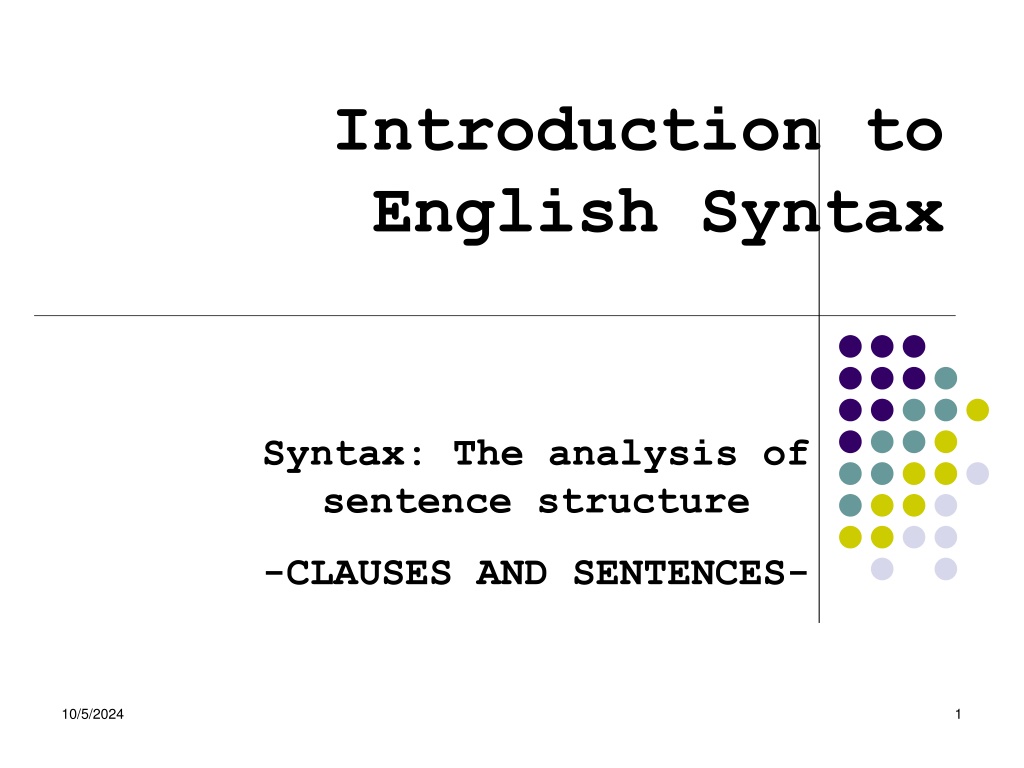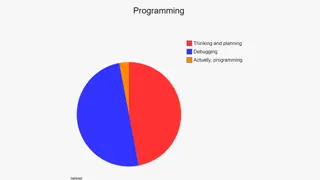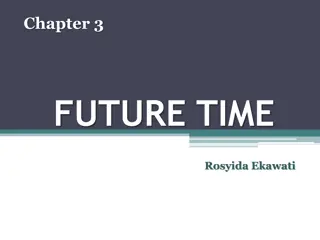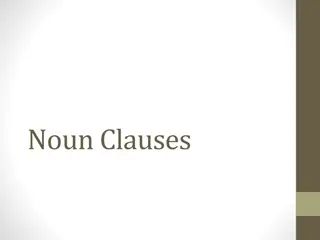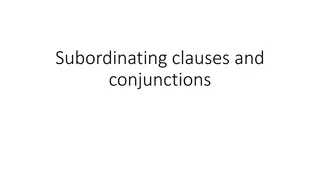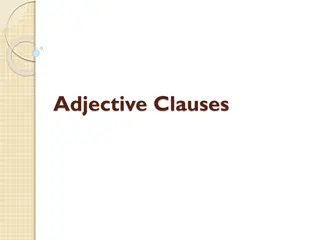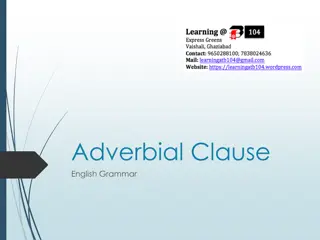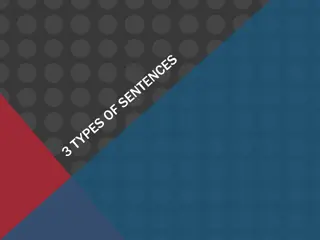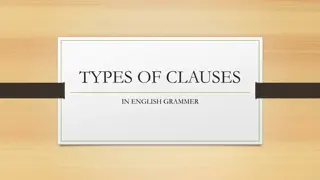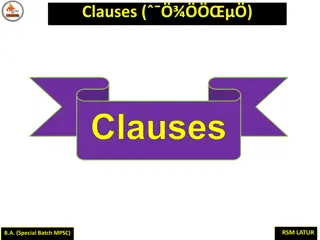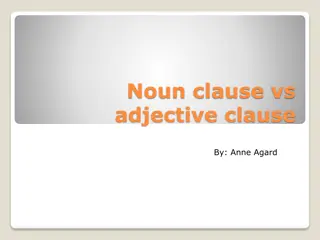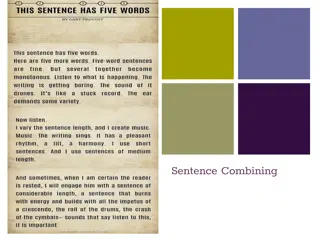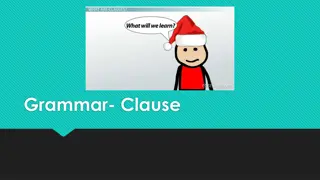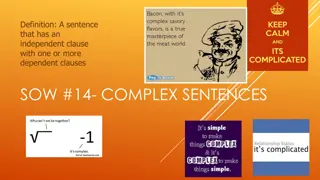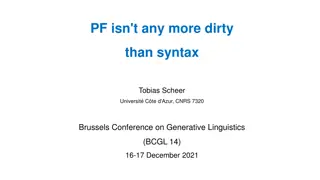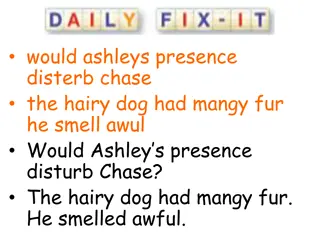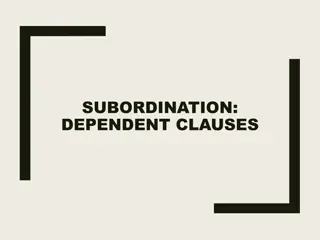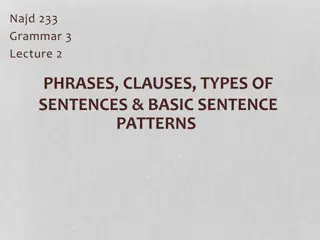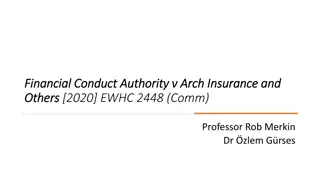Understanding English Syntax: Clauses and Sentences Analysis
Delve into the major properties of clauses, including finite verbs, mood distinctions, and descriptions of situations and participants. Explore compound and complex sentences with main and subordinate clauses, along with complement clauses in English syntax analysis.
Uploaded on Oct 05, 2024 | 0 Views
Download Presentation

Please find below an Image/Link to download the presentation.
The content on the website is provided AS IS for your information and personal use only. It may not be sold, licensed, or shared on other websites without obtaining consent from the author. Download presentation by click this link. If you encounter any issues during the download, it is possible that the publisher has removed the file from their server.
E N D
Presentation Transcript
Introduction to English Syntax Syntax: The analysis of sentence structure -CLAUSES AND SENTENCES- 10/5/2024 1
What are the major properties of a clause? Each clause contains a finite verb; that is, a verb marked for tense. Finite verbs are traditionally said to be marked for tense, person and number. In each clause, the finite verb is accompanied by its complements and adjuncts. Each clause is marked for aspect and the aspect can be changed: compare Wickham was eloping with Lydiaas opposed to Wickham eloped with Lydia. 10/5/2024 2
Each clause has mood. Mood has to do with two sets of distinctions: 1. First, there are the distinctions between making statements (Wickham eloped with Lydia), asking questions (Did Wickham elope with Lydia?), and issuing commands (Elope with Lydia!). 2. The second set of distinctions has to do with whether the speaker or writer presents an event as possible (He may have eloped with Lydia) or as necessary (He must have eloped with Lydia) or as a fact (He did elope with Lydia.) 10/5/2024 3
Clauses describe situations, the participants in them (for example, Agents carrying out actions on Patients, as in Frank [Agent] persuaded Jane [Patient] to keep the secret, and the circumstances in which they take place, as in Frank Churchill was in Hartfield [place] in June [time]). 10/5/2024 4
Main and subordinate clauses Compound sentences consist of two or more clauses joined by conjunctions. Example: 1. Captain Benwick married Louisa Hayter and Captain Wentworth married Anne Elliott. 2. Henry Crawford loved Fanny but Fanny loved Edmund. 3. Mr Bingley became tired of Jane or Mr D Arcy persuaded Mr Bingley to go to London. 10/5/2024 5
Subordinate clauses Complex sentences consist of a main clause and one or more other clauses subordinate to it. That is, one clause, the main clause, is preeminent in a complex sentence and the other clauses, the subordinate clauses, are subject to certain limitations 10/5/2024 6
Complement clauses A. Elizabeth regretted that she had met Wickham. B. Catherine feared that the Abbey was haunted. These clauses were traditionally called noun clauses , because they occur in slots in the main clause that can be occupied by ordinary noun phrases Elizabeth regretted her actions and Catherine feared the General s temper . The contemporary label complement clause reflects the relationship between the clauses and the verb of the main clause: Elizabeth regretted and Catherine feared are incomplete pieces of syntax which require a modifier, either a noun phrase as in the immediately preceding examples or a clause. 10/5/2024 7
C. Complement clauses also occur to the left of verbs, as in: "That Anne was in conversation with Mr. Elliott dismayed Captain Wentworth. D. The skeleton of the sentence above is [ ] dismayed Captain Wentworth , the square brackets marking the slot waiting for some constituent. The slot could be filled by a noun phrase such as Her words but in the sentence above is filled by the complement clause "That Anne was in conversation with Mr Elliott". 10/5/2024 8
E. Complement clauses can modify a noun, as in: Fanny was delighted by the idea that she could subscribe to a library *The sequence Fanny was delighted by the idea is a complete clause. The additional that she could subscribe to a library conveys the content of the idea. It is not required to complete the syntax, but as we will see later it is not a relative clause and has been given the label complement clause because it fills out the meaning of the word idea 10/5/2024 9
Other examples of noun complement clauses are: 1. Who thought up the proposal that the committee be abolished? 2. There was a plan that we would visit Glasgow today but the weather is terrible. 10/5/2024 10
Relative clauses Complement clauses modify verbs and nouns; relative clauses modify nouns. In older descriptions, relative clauses are called adjective clauses, reflecting the fact that adjectives also modify nouns. Examples: The cottage which Mrs Dashwood accepted was rather small. The gentleman who saved Mariannewas Willoughby. The book which Marianne was reading contained poems by Cowper. The building that we liked is in Thornton Lacey. 10/5/2024 11
Adverbial clauses The name adverbial suggests that adverbial clauses modify verbs; but they modify whole clauses. Their other key property is that they are adjuncts, since they are typically optional constituents in sentences. They are traditionally classified according to their meaning, for example adverbial clauses of reason, time, concession, manner or condition, as illustrated below: 10/5/2024 12
a. Reason Because Marianne loved Willoughby, she refused to believe that he had deserted her . *The adverbial clause of reason in "Because Marianne loved Willoughby", gives the reason (or the writer uses it to give the reason) why Marianne refused to believe that Willoughby had gone. It modifies the main clause she refused to believe that he had deserted her . 10/5/2024 13
b. Time When Fanny returned, she found Tom Bertram very ill. 10/5/2024 14
c. Concession Although Mr D Arcy disliked Mrs Bennet he married Elizabeth. *The adverbial clause of concession in "Although Mr D Arcy disliked Mrs Bennet", conveys a concession. The writer says, as it were, OK. I concede that he didn t like Mrs Bennet. Nonetheless he married Elizabeth. The adverbial clause modifies the main clause "he married Elizabeth." 10/5/2024 15
d. Manner Henry changed his plans as the mood took him *The adverbial clause of manner in "as the mood took him", describes the manner in which Henry changed his plans and modifies the main clause "Henry changed his plans." 10/5/2024 16
e. Condition If Emma had left Hartfield, Mr. Woodhouse would have been unhappy *The adverbial clause of condition "If Emma had left Hartfield" conveys the circumstances or conditions under which a particular situation would have arisen. The situation is Mr. Woodhouse being unhappy, and the writer declares that this situation did not actually come about but would have done; Emma s leaving Hartfield would have brought it about. The crucial fact is the relationship between the two situations; Mr. Woodhouse s being unhappy is conditional upon Emma s leaving Hartfield. The adverbial clause of condition modifies the main clause "Mr. Woodhouse would have been unhappy." 10/5/2024 17
Complementizers and subordinating conjunction In grammars from before, say, 1965, the words introducing complement clauses and adverbial clauses were generally known as "subordinating conjunctions", and words such as "and" or "but" were known as "coordinating conjunctions". Coordinating conjunctions join clauses that have the same status. Subordinating conjunctions introduce subordinate clauses. Since 1965 or so, the term complementizer has been used in one of the major theories of syntax not just for subordinating conjunctions introducing complement clauses but for all subordinating conjunctions. 10/5/2024 18
Recognizing clauses A. Does it modify another clause? If it does, it is an ADVERBIAL CLAUSE. B. Does it modify a verb? If it does, it is a (VERB) COMPLEMENT CLAUSE. C. Does it modify a noun? If it does, it could be a RELATIVE CLAUSE or a COMPLEMENT CLAUSE 10/5/2024 19
C(i) Is the subordinate clause introduced by a WH word such as who, which, where, or by a prepositional phrase such as in which? If it is, it is a relative clause. C(ii) Is the subordinate clause introduced by that? If it is, it could be either a relative clause or a complement clause. If it is a relative clause, that can be replaced by "which" and so on. If it is a complement clause, "that" cannot be replaced by a WH word. 10/5/2024 20
Final comment In the above examples, the relative and complement clauses are introduced by "that", "who" and "which". Relative and complement clauses often follow their head noun or verb directly, without a complementizer, as in: 1. I love the food they cook in the halls of residence. 2. A motorist has reported the road is blocked at Soutra Hill. 3. I am delighted at the idea they might demolish the Appleton Tower. 10/5/2024 21
The lack of a complementizer does not affect the rules of thumb. Example (b) contains a verb complement clause, "the road is blocked at Soutra Hill", which modifies "reported"; (a) contains a relative clause, "they cook in the halls of residence", modifying "food"; and (c) contains a complement clause, "they might demolish the Appleton Tower", modifying the noun "idea" 10/5/2024 22
Exercises The following exercises contain sentences consisting of two or more clauses. Analyze each sentence into its clauses and state the type of each clause main clause, adverbial clause (of reason, concession and so on), relative clause, complement clause. 10/5/2024 23
A. 1. Jane believes that the earrings she got from Susan are real silver. 2. I ll believe it when I see it. 3. If you think Scotland are ever going to win the European Championship, you must be a real optimist. 4. The article in which the theory was put forward is now unobtainable. 5. That Helen is to marry the man she met on holiday has surprised all her friends. 6. Celia did not say that you could keep the book that you borrowed. 7. Because you are flying non-stop, you will probably have severe jet-lag. 8. He promised that he would be here on time, though I find it difficult to rely on him. 9. The woman whose car you think you have dented is our MP. 10.That you don t like my home-made vodka I find difficult to believe. 11.Since you think you are ready to sit the test, come along tomorrow. 12.That the club regained the trophy dismayed the teams that had better players. 10/5/2024 24
B. 1. We regret that the plan is impracticable. 2. They accept the theory that the world is flat. 3. They accept the theory that the group proposed. 4. Did Fiona say who would be at the party? 5. Which of the candidates will be elected is quite unpredictable. 6. It is believed by some historians that Napoleon was poisoned. 10/5/2024 25
C. 1. Kirsty went out and forgot to switch off the gas fire. 2. We know that she wrote several novels and threw them away. 3. The editors who ignored the ban and printed the story might find themselves in prison. 4. If you go walking on the hills in winter and do not take proper equipment, you are asking for trouble. 10/5/2024 26
D. 1. They are pioneering a new geography in which they will establish when new races settled in particular regions. A geneticist says the Pacific islands are an ideal testing ground for the theory that the Pacific was colonized from west to east. The history begins with the day when the chief medical officer for Vanuatu noticed that a large number of people there suffered from anaemia. He was advised to treat them with iron supplements so he contacted scientists at Oxford who found that half of the donors suffered from alpha-thalassaemia, which is usually linked to the presence of malaria. It seems that the gene protects against malaria, since carriers of the alpha 3.7 mutant will not die of malaria even if they contract a severe bout. Although anthropological studies have been inconclusive, previous biological research has suggested that there was no contact while the Melanesians were moving east. 10/5/2024 2. 3. 4. 5. 6. 27
